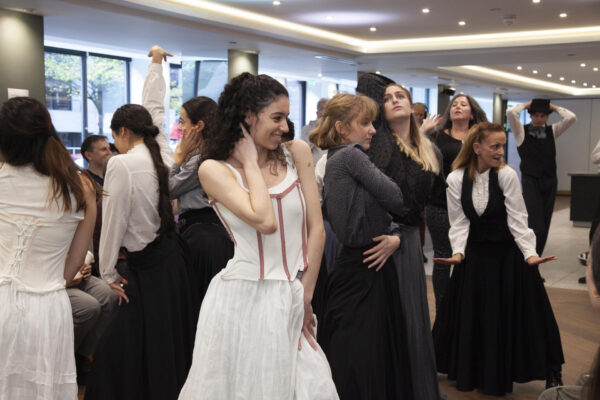‘Transforming Research into Exciting Public Engagement’ A workshop given By Julia Pascal at the London Victorian Studies Colloquium 2024 18 April 2024.
The Colloquium was hosted at the Centre of Victorian Studies at Royal Holloway, University of London.
A Reflection by Julia Pascal
In this workshop I gave at Royal Holloway College, I spoke about the creation of public performance revealing unknown Victorian women to a wider public as a component of the Pascal Theatre Company’s Lottery Heritage Funded project Women for Women. I also explained the importance of creating a website for international access to the knowledge we are accumulating.
Focusing on a performance Eleanor Marx: A Life in Movement which exposed the achievements of Eleanor Marx, I showed a video to share methodology. For the academic audience attending the workshop there was a clear need to have inspirational ideas about how to translate academic research into living performance. I explained that, as a writer-director, I was aware that my community, drawn from those with varied and cultural and educational and backgrounds, would need to be engaged. This would provoke different reactions to the presentation of Eleanor Marx. Some would know a little about her: most would not and many would never have heard of her.
As academic study must always have a historical context, I was keen to show how I dealt with this within the production. Central to the character of Eleanor Marx was her position as a revolutionary. How could I explain that without wordy exposition? This was my question. I arrived at an answer through music.
La Marseillaise was the song of the French Revolution. It had been taken up worldwide as an expression of revolution. During the workshop, I played a clip of Ruth Getz singing La Marseillaise within the performance. It was simple way of revealing how a complex historical thesis can be translated into a simple theatrical moment.
I then discussed that the theatrical site-specific work needed to be structured with attention to location. We used a hotel dining room with performers dancing and speaking in a corridor between the audience so that the movement was always flowing. This is traverse staging. It was important to keep changing the action so that the effect would be rather like a series of sparklers going off to keep the attention of children as well as of adults.

The production could not last long, 30-40 minutes, as many of the audience from local housing or those whose first language was not English, would have a short attention span. The layering of content was also discussed. For example, I showed a sequence where the cast sing and dance Humpty Dumpty. This nursery rhyme is fun for children and for adults. It evokes the thought that to make an omelette you have to break eggs. In other words, revolution means the removal, and sometimes murder, of a dictatorship. Heads must roll.
The last part of the workshop engaged the participants in exploring their own development and showed them how to move academic study into the realm of public engagement. I asked attendees to play with simple text: The verb ‘to be’. Working individually, and in couples, they played around with what might happen if they used only the verb to communicate. They found saying I am, you are, he is, we are, they are a challenge at first but gradually, as their voices moved into questions, they discovered deeper elements of possible subtext.
The next exercise was working with childhood song. One person wanted to explore Row, Row, Row Your Boat…. I asked her to partner with another woman. The first was then asked to tell Mary Shelley’s story of Frankenstein from Victor’s point of view. She did this as the second woman sang the boat song. A disturbing tension was set up in this mini performance which surprised and informed the two women and the audience.
I then asked for feedback on how those present could see how the work might inform their future practice. One man working in disability theatre said that this was a new way for him to look at making performance. Others said they had never previously known how to
socially engage other than through the printed word and that they wished to continue this journey of putting academic research up on its feet. One person asked, ‘Can any subject at all be dramatized for public engagement?’ My response was that, with imagination, I
believe that it can.
The workshop opened up new questions and encouraged those who attended to make collaborations with artists to take the research off the page and into the community.
Some questions raised and answered included:
Did the students learn anymore about Eleanor Marx?
How do you reveal research/exposition?
How do you measure public engagement?
How do you get an audience?
How do you publicise the event?
How do you embody theory?
How would you work with disability?
If you would like to know how I answered these and more of my process of transforming research into public performance, please contact me.
admin@pascal-theatre.com
Biography

